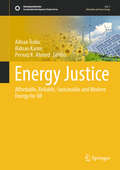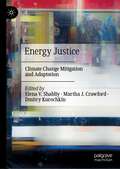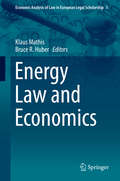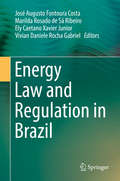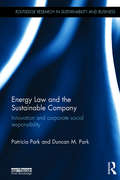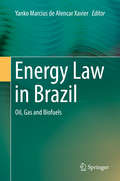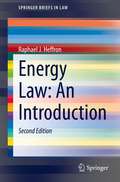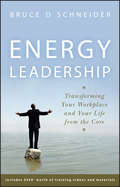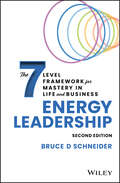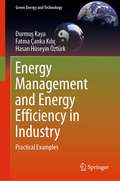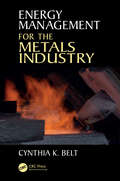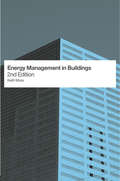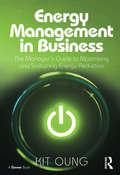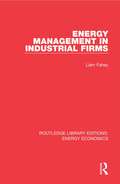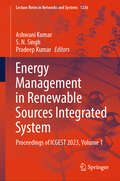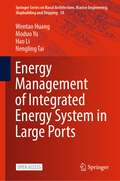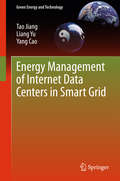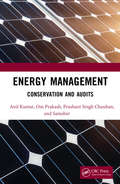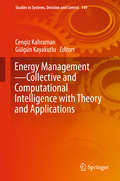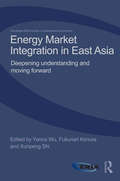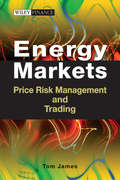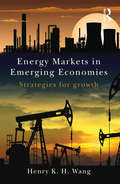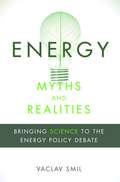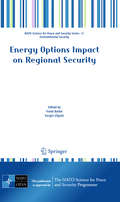- Table View
- List View
Energy Justice: Affordable, Reliable, Sustainable and Modern Energy for All (Sustainable Development Goals Series)
by Adnan Trakic Pervaiz K. Ahmed Ridoan KarimThis book delves into the pressing issue of energy justice as it relates to SDG 7 and its far-reaching implications for society. With a comprehensive exploration of various aspects, from reducing energy burdens to political considerations, environmental justice, and human rights, this thought-provoking collection of chapters offers a profound understanding of the challenges and potential solutions surrounding energy justice. Starting with an introduction to the concept of energy justice and its significance, the editors lay the groundwork for an engaging discourse. The book then delves into the disproportionate energy burdens faced by low-income communities, shedding light on the difficult choices they must make to meet their basic needs. It further examines the intricate interplay between energy justice, politics, and environmental concerns, striving to find a harmonious balance. Drawing from a diverse range of perspectives, the chapters explore the intersection of energy justice with human rights, analyzing its implications for countries worldwide. The book also investigates the influence of disruptive events on renewable energy programs, presents an Islamic perspective on energy justice, and highlights the roles of the financial sector, fossil fuel industry, nuclear energy sector, and energy technology innovation in mitigating energy injustice. Chapter 'The Role of the Financial Sector in Energy Justice' is available open access under a Creative Commons Attribution 4.0 International License via link.springer.com.
Energy Justice: Climate Change Mitigation and Adaptation
by Martha J. Crawford Elena V. Shabliy Dmitry KurochkinThis book offers an insight into climate change mitigation and adaptation strategies and discusses energy justice issues within this framework. The concepts of sustainability and sustainable development have become popular among local communities, international policymakers, and researchers. In addition to these important topics, themes such as climate justice, environmental justice, global energy justice, ecological justice, sustainable justice, and procedural justice remain attractive to scholars and researchers internationally. In this book, scholars elaborate on various responses to human-induced climate change, calling for action, mitigation, and adaptation, and encouraging further thorough analysis and research in the field.
Energy Law and Economics (Economic Analysis of Law in European Legal Scholarship #5)
by Klaus Mathis Bruce R. HuberThis book offers an edited volume for all readers who wish to gain an in-depth grasp of the economic analysis of recent developments in energy law and policy in Europe and the United States. In response to waning resources and heightened environmental awareness, many countries are now seeking to redefine their energy mix. Several energy sources are available: coal and oil, natural gas, and a variety of renewables. Yet which of them are capable of addressing core energy-related concerns? Reliability, security, affordability, fairness, and sustainability all have to be taken into account. Further, once a target mix has been identified, two challenges remain for legal scholars: what role does the law play in achieving a specified energy mix, and, how can the law best fulfill that role? The essential energy concerns are just as important in defining the way we shape our energy mix as they are in defining the mix itself.An example of current challenges in energy law and policy can be seen in the pursuit by the German and Swiss governments of the so-called “Energiewende” (energy transition). These policies are intended to enable the transition from a non-sustainable use of fossil and nuclear energy to a more sustainable approach based on renewable energies. On the one hand, the goal is to achieve a decarbonization of the energy economy by reducing the use of fossil energy sources such as petroleum, carbon and natural gas. On the other, and in response to the Fukushima nuclear accident, a phase out is intended to eliminate the dangers of nuclear technologies. Achieving these goals poses tremendous challenges for the two countries’ energy policies – partly because the energy transition will not only affect energy production, but also energy consumption.From a Law and Economics perspective, a number of questions arise: to what extent is it justifiable to rely on markets and continued technological innovation, especially with regard to the present exploitation of scarce resources? To what extent is it necessary for states to intervene in energy markets? Regulatory instruments are available to create and maintain more sustainable societies: command and control regulations, restraints, Pigovian taxes, emission certificates, nudging policies, and more. If regulation in a certain legal field is necessary, which policies and methods will most effectively spur the sustainable consumption and production of energy in order to protect the environment while mitigating any potential negative impacts on economic development? Do neoclassical and behavioural economics provide us with a suitable framework for predicting the market’s complex reactions to a changing energy policy? This book provides theoretical insights as well as empirical findings in order to answer these vital questions.
Energy Law and Regulation in Brazil
by José Augusto Fontoura Costa Marilda Rosado de Sá Ribeiro Ely Caetano Xavier Junior Vivian Daniele Rocha GabrielThe book presents contributions from Brazilian experts on the regulation of different energy sources. Focusing on describing and discussing the fundamental issues related to the legal regulation of each of the sources that compose Brazil's energy matrix, it also analyzes economic and strategic aspects and identifies the main current problems related to the exploration for and production of each energy source. The book offers a clear and detailed overview of energy law and regulation for policymakers, foreign investors and legal professionals dealing with energy projects in Brazil.
Energy Law and the Sustainable Company: Innovation and corporate social responsibility (Routledge Research in Sustainability and Business)
by Patricia Park Duncan Magnus ParkWhat kind of decision-making should multinationals engage in to create a sustainable company? There is substantial debate over why CEOs, senior management and Boards of Directors make the wrong decisions by not asking the right questions, with the result that not only is the company itself damaged, but all of the stakeholders find themselves at a detriment. Focusing on innovation, technology transfer and the use of intangible assets, Energy Law and the Sustainable Company features case studies from the oil and gas sector, to illustrate how to develop a sustainable business. Considering corporate social responsibility from the perspective of international and national law, the book demonstrates how companies can be both profitable and ethical using the influences of psychology to encourage senior decision makers to make the right decisions. It was revealed that reputation was the main principle influencing decision-making. The book also discusses how companies have reported on their sustainability strategy and considers how technology transfer and intangible assets may play a part in addressing global sustainability. This book should be invaluable reading to students and scholars of Sustainable Business, Business Law, Corporate Social Responsibility, Environmental and Energy Law as well as Environmental and Energy Management.
Energy Law in Brazil
by Yanko Marcius de Alencar XavierThis book describes the energy-law situation in Brazil. It focuses on three specific energy sectors: oil, natural gas and biofuel. The decision to concentrate on these areas takes into account the role that these energy sectors play in the economic, political and legal systems in Brazil, as well as the fact that they are the primary subjects of current discussions surrounding economic regulation in the country. The book, composed of thematic chapters authored by specialized legal researchers, analyzes the different aspects of the oil, gas and biofuels industry, starting with an introduction and technical points and followed by a discussion of the legal issues. It also considers the different legal areas used to examine the aforementioned energy sectors, such as regulatory law, environmental law, tax law, international law, among others. The book will serve as a valuable guide for researchers interested in understanding Brazilian energy law, and at the same it time presents the state of the art of studies carried out in Brazil.
Energy Law: An Introduction (SpringerBriefs in Law)
by Raphael J. HeffronThe aim of this short text is simply to introduce a reader to this topic. It is intended for a global audience and rather than being restricted to potential energy law students of a particular country. It is also written for students of other disciplines such as geographers, social scientists and engineers. It should also be engaging to those in a variety of professional practices who want an accessible background to and overview of the subject.The first edition of Energy Law: An Introduction was a great success and this extended second edition is expected to be just as successful. It is used widely as a core text in energy law courses across the world and this second issue adds further discussion on important topics such as energy law principles and drivers. Further, it highlights issues of energy justice, a growing and an emergent topic which is also at the core of the energy law principles and the key drivers of why new energy law is formulated.The text aims to outline the principles and central logic behind energy law. Therefore, readers from across the world should be able to use it as a guide to thinking about energy law in their own countries. A variety of examples from many different countries are included in the text and while examples and comparisons are mainly from the EU and US, they represent good examples of more advanced and innovative energy law.For those readers who seek further or more in-depth knowledge, this text will only serve as an introduction. However, a key focus of the book is to direct the reader where they to look for further information and within the book there are suggested extra readings, the key recommended journals to read and other sources of information based on institutions who publish further material in this area. Overall this second edition of Energy Law: An Introduction aims to inspire students and others to contribute to try and improve energy law across the world and enable us all to contribute in our own small way to delivering a just and sustainable energy world for future generations.
Energy Leadership
by Bruce D. SchneiderIn Energy Leadership, renowned coach Bruce D. Schneider teaches how to understand the most important personal resource of all -- energy, and shows how to harness it to achieve success in the workplace, the home, and in the world at large.This engaging and fast-paced story clearly explains how managers and leaders from all walks of life can use the principles of Energy Leadership to inspire themselves and others to achieve extraordinary results in whatever they do. The author provides insight into a cutting edge coaching process he has developed, which has positively impacted the lives of tens of thousands of people in both the corporate and private sectors.You will learn how to: Recognize the seven distinct levels that are the key to understanding why everyone thinks and acts the way they do, in life and specifically within the workplace. Distinguish truly effective leaders from those who deplete the energy of the people around them, and specific techniques to shift energy levels to inspire peak performance. Become powerful leaders who motivate themselves and others to reach their true potential. Identify the Big Four Energy Blocks and discover proven techniques and strategies for overcoming these and other obstacles to success. Develop the ability to shift internal energy to meet any leadership challenge, and use this newfound power to inspire respect, confidence, and loyalty in others.If you always try to inspire others but sometimes feel like something?s missing, something is. Energy Leadership puts you in touch with the missing link between your ambitions and your ability to achieve them.
Energy Leadership: The 7 Level Framework for Mastery In Life and Business
by Bruce D SchneiderAwaken your potential by harnessing the power of your energy. How do you awaken the extraordinary potential in yourself and others? In the newly revised second edition of Energy Leadership: The 7 Level Framework for Mastery In Life and Business, Bruce D Schneider, Master Certified Coach and founder of iPEC, the global coach training and leadership development company, offers a simple yet powerful answer to that question, and it all boils down to one word—energy. Whether you&’re looking to create profound change in your personal life or build a conscious work culture humming with creativity, innovation, and unimaginable growth, you&’ll find the practical Energy Leadership™ framework and Core Energy Coaching™ skills contained within these pages to be an invaluable resource on your journey. And now, for the first time ever, you&’ll receive additional information once available only to participants in iPEC&’s advanced coach training program. You&’ll learn how to: Recognize the seven distinct levels of energy that are the key to understanding why everyone thinks and acts the way they do. Achieve peak performance by exploring the six factors that influence your energy and implementing specific techniques to shift energy in the moment. Identify what blocks and diminishes your energy and discover proven strategies for overcoming these and other obstacles to success. Become more powerful and effective in all aspects of your life. Motivate yourself and others to reach their full potential.In the 15 years since the publication of the first edition of Energy Leadership, hundreds of thousands of people around the world have discovered the remarkable personal and professional transformation that&’s possible with this groundbreaking methodology—and now you can, too. Visit ipeccoaching.com to learn more.
Energy Management and Energy Efficiency in Industry: Practical Examples (Green Energy and Technology)
by Durmuş Kaya Fatma Çanka Kılıç Hasan Hüseyin ÖztürkThis book is presented to demonstrate how energy efficiency can be achieved in existing systems or in the design of a new system, as well as a guide for energy savings opportunities. Accordingly, the content of the book has been enriched with many examples applied in the industry. Thus, it is aimed to provide energy savings by successfully managing the energy in the readers’ own businesses. The authors primarily present the necessary measurement techniques and measurement tools to be used for energy saving, as well as how to evaluate the methods that can be used for improvements in systems. The book also provides information on how to calculate the investments to be made for these necessary improvements and the payback periods. The book covers topics such as: • Reducing unit production costs by ensuring the reduction of energy costs, • Efficient and quality energy use, • Meeting market needs while maintaining competitive conditions, • Ensuring the protection of the environment by reducing CO2 and CO emissions with energy saving and energy efficiency, • Ensuring the correct usage of systems by carrying out energy audits. In summary, this book explains how to effectively design energy systems and manage energy to increase energy savings. In addition, the study has been strengthened by giving some case studies and their results in the fields of intensive energy consumption in industry. This book is an ideal resource for practitioners, engineers, researchers, academics, employees and investors in the fields of energy, energy management, energy efficiency and energy saving.
Energy Management for the Metals Industry
by Cynthia K. BeltEnergy management training and solutions are not one size fits all. While some general methods apply, the metals industry has its own unique processes and environments for which a more tailored approach is necessary. Aimed at managers, engineers, and supervisors working in the metals industry, Energy Management for the Metals Industry offers specifics that can help readers in the metals field achieve energy savings for their companies. The book explains general energy management methods and offers approaches germane to the metals industry. It discusses the benefits and reasons for implementing an energy management program and the requirements necessary to begin one. The book covers defining and measuring performance, setting baselines, and benchmarking a plant and its processes. It also discusses analyzing data, identifying projects, improving processes, setting goals, and creating an action plan, while controlling and evaluating progress. Real-world examples highlight concepts and illustrate potential pitfalls.
Energy Management in Buildings
by Keith MossManaging the consumption and conservation of energy in buildings is the concern of both building managers and occupants and this use accounts for about half of UK energy consumption. The need to manage this has been given new emphasis by the introduction of the Climate Change Levy. Energy Management in Buildings introduces students and energy managers to the principles of managing and conserving energy consumpton in buildings people use for work or leisure. Energy consumption is considered for the provision of space heating, hot water, supply ventilation and air conditioning. The author introduces the use of standard performance indicators and energy consumption yardsticks and discusses the use and application of degree days. This second edition includes two new chapters on current regulations and environmental impact of building services. It closely follows recent bench marking published by CIBSE and the Defra energy efficiency Best Practice Programme and covers unit 18 in the new HND in building services engineering.
Energy Management in Buildings Using Photovoltaics
by Elena PapadopoulouAlthough fossil fuels remain the primary global energy source, developing and expanding economies are creating an ever-widening gap between supply and demand. Efficient energy management offers a cost-effective opportunity for both industrialized and developing nations to limit the enormous financial and environmental costs associated with burning fossil fuels. The implication of photovoltaic systems in particular presents the potential for clean and sustainable electrical energy to be generated from an unrestricted source. Energy Management in Buildings Using Photovoltaics demonstrates how adopting 'best practices' for energy management and harvesting can reduce the need to construct new generating facilities. Illustrated with figures, tables and photos, Energy Management in Buildings Using Photovoltaics provides an introduction and step by step instructions on designing and planning photovoltaic systems and energy policies for both residential and industrial buildings. With particular focus on the example of provided by European industry, the creation of energy efficient systems is explored including chapters on: Zero Energy Buildings, Photovoltaics Technology, and Connection of the Network By presenting this topic from basic introduction to highly technical analysis, Energy Management in Buildings Using Photovoltaics acts a study guide for postgraduate students as well as a key point of reference for researchers and technical consultants in the field of photovoltaic systems.
Energy Management in Business: The Manager's Guide to Maximising and Sustaining Energy Reduction
by Kit OungThe business benefits of lower energy consumption are clear: lower energy costs, energy tax avoidance, selling excess CO2 credits, immediately adding savings to the bottom line and improved competitiveness. However, with a need to focus on day to day business management activities, implementing energy reduction programmes stretches the capabilities and know-how of responsible managers. Kit Oung’s Energy Management in Business is an expert's guide to energy reduction. It covers four important aspects of managing energy: strategy for successful implementation, available tools and techniques, generating sustainable quick wins and active management involvement. This book offers distilled practical concepts with real life case studies chosen to build insight, and illustrate how managers and engineers can relate to a broad range of energy reduction opportunities. We take energy for granted, like the air we breathe. We need to engage employees with energy management in two ways. In a more general sense, for those using energy for normal working practices, awareness and behaviour change are key. For those with more direct influence over energy using systems, engagement is also fundamental. Energy Management in Business places the process firmly in the context of commercial and industrial business practice. The book is an excellent companion for any organisation seeking ISO 50001 certification and a reduced energy consumption, as well as those that simply wish to better understand the options, strategies and risks that every business now faces.
Energy Management in Industrial Firms (Routledge Library Editions: Energy Economics)
by Liam FaheyThis book discusses the extent to whcih differences exist in the approach to energy management by different types of firms: large multidivisional firms at corporate headquarters level and division level and independent firms, energy intensive and non-energy intensive firms and growth and non-growth firms. Although originally published in 1984, the significance of the study is reflected by the continued timeliness and urgency of many of the issues covered such as the need for a national energy policy and the potential for improvement in industrial energy efficiency and conservation.
Energy Management in Renewable Sources Integrated System: Proceedings of ICGEST 2023, Volume 1 (Lecture Notes in Networks and Systems #1236)
by Ashwani Kumar Pradeep Kumar S. N. SinghThe book constitutes proceedings of the International Conference on Green Energy and Sustainable Technology, ICGEST 2023. The book covers research in energy management, planning the operation of renewable energy systems, distributed generation and energy management, economics/ electricity market and policy/ regulatory aspects, data analytics & AI applications in smart grid. This book contains research papers from academicians, researchers, and students. This book is a valuable resource for students, academics, and practitioners in the industry working on energy areas.
Energy Management of Integrated Energy System in Large Ports (Springer Series on Naval Architecture, Marine Engineering, Shipbuilding and Shipping #18)
by Hao Li Wentao Huang Moduo Yu Nengling TaiThis open access book provides a detailed exploration of energy management in seaport integrated energy systems, highlighting their potential to replace conventional fuel-based energy usage and promote sustainable development of large ports. In order to achieve carbon neutrality, energy management technologies are crucial for the sustainable development of port systems that couple energies, logistics, and maritime transportation. Research on seaport integrated energy systems has attracted scholars and scientists from various disciplines, such as port electrification, logistics, microgrids, renewable energies, energy storages, and port automation. Taking a holistic approach, this book establishes a fundamental framework for the topic and discusses the electrification process, coupling mechanisms and modeling, optimal planning, low-carbon and economic operation, as well as applications of integrated energy systems in seaports. This book is intended for researchers, graduate students, and other readers interested in green seaport energy management and low-carbon operation technologies under the coupling between logistics and multi-energy systems.
Energy Management of Internet Data Centers in Smart Grid
by Tao Jiang Liang Yu Yang CaoThis book reports the latest findings on intelligent energy management of Internet data centers in smart-grid environments. The book gathers novel research ideas in Internet data center energy management, especially scenarios with cyber-related vulnerabilities, power outages and carbon emission constraints. The book will be of interest to university researchers, R&D engineers and graduate students in communication and networking areas who wish to learn the core principles, methods, algorithms, and applications of energy management of Internet data centers in smart grids.
Energy Management: Conservation and Audits
by Anil Kumar Om Prakash Prashant Singh Chauhan Samsher GautamEnergy Management: Conservation and Audit discusses the energy scenario, including energy conservation, management, and audit, along with the methodology supported by industrial examples. Energy economics of systems has been elaborated with concepts of life cycle assessment and costing, and rate of return. Topics such as energy storage, co-generation, and waste heat recovery to energy efficiency have discussed. The challenges faced in conserving energy sources (steam and electricity) have elaborated along with the improvements in the lighting sector. Further, it covers optimization procedures for the development in the industry related to energy conservation. The researchers, senior undergraduate, and graduate students focused on Energy Management, Sustainable Energy, Renewable Energy, Energy Audits, and Energy Conservation. This book covers current information related to energy management and includes energy audit and review all the leading equipment (boilers, CHP, pumps, heat exchangers) as well as procedural frameworks (energy audits, action planning, monitoring). It includes energy production and management from an industrial perspective, along with highlighting the various processes involved in energy conservation and auditing in various sectors and associated methods. It also explores future energy options and directions for energy security and sustainability.
Energy Management—Collective and Computational Intelligence with Theory and Applications: Collective And Computational Intelligence With Theory And Applications (Studies In Systems, Decision And Control #149)
by Cengiz Kahraman Gülgün KayakutluThis book presents a selection of recently developed collective and computational intelligence techniques, which it subsequently applies to energy management problems ranging from performance analysis to economic analysis, and from strategic analysis to operational analysis, with didactic numerical examples. As a form of intelligence emerging from the collaboration and competition of individuals, collective and computational intelligence addresses new methodological, theoretical, and practical aspects of complex energy management problems. The book offers an excellent reference guide for practitioners, researchers, lecturers and postgraduate students pursuing research on intelligence in energy management. The contributing authors are recognized researchers in the energy research field.
Energy Market Integration in East Asia: Deepening Understanding and Moving Forward (Routledge-ERIA Studies in Development Economics)
by Fukunari Kimura Yanrui Wu Xunpeng ShiEast Asian nations through the dialogue between ASEAN and its partners have been promoting energy market integration (EMI) for a decade. The formation of the East Asian Summit (EAS) group in 2005 adds new momentum to the EMI course in the region. The objective of this edited volume is to present new insights into the understanding of EMI in East Asia and draw implications for further development. This book is the first publication of its kind exclusively focusing on EMI in East Asia. The chapters are written by a distinguished group of specialists in the field of energy policy, business and economics. The covered topics range from the general debates about EMI to regional policy responses. A variety of qualitative and quantitative methods are employed in this book. For qualitative methods, public goods theory and the comparative study method are two examples. The quantitative methods include economic growth theory, principle component approach, input-output table, computable general equilibrium (CGE) models and econometric techniques. Important policy implications can be drawn from the findings. One clear message is that EMI should be promoted actively but in a gradual, incremental manner. Other policy implications are related to inter-regional governance, infrastructure development and gas market integration. The content has not been published elsewhere and hence makes a unique contribution to the literature. There are also case studies of specific energy sectors such as petroleum and natural gas. Overall this book should be of interest to a wide audience such as academia, business analysts and policy makers.
Energy Markets
by Tom JamesPrice Risk Management and Trading.Energy risk management expert, Tom James, does it again. His latest book is a timely addition to the rapidly developing energy trading markets. This book should be on every energy trader, risk manager and corporate planer's desk. it is an easy read as Tom goes into great detail to explain the intricacies of this market and its various unique elements. - Peter C. Fusaro, Chairman, Global Change Associates Inc., Best-selling Author and Energy ExpertThis sensible and practical guide is essential for those seeking an understanding of commerce in energy derivatives. beyond merely informative, this hand book for the practitioner details the finer points of the use of derivatives as tools for price-risk management. No energy trading desk should be without it. - Ethan L. Cohen, Senior Director, Utility and Energy Technology, UtiliPoint International Inc.Energy markets are much more volatile than other commodity markets, so risk mitigation is more of a concern. Energy prices, for example, can be affected by weather, geopo9litical turmoil, changes in tax and legal systems, OPEC decisions, analysis' reports, transportation issues, and supply and demand - to name just a few factors. Tom James's book is a practical guide to assessing and managing these risks. It is a must-read for senior management as well as risk and financial professionals.- Don Stowers, Editor, Oil & Gas Financial JournalThis book is the most comprehensive on price risk management-centric efforts. It provides the reader with a tangible experience of derivatives in today's capital and energy markets. The breadth and scope of the passages are immense, in that both developed and developing countries' energy markets are considered and examples applied. Terrific read! - Rashpal Bhatti, Marketing Manager, Energy Trading Asia, Enron/BHP BillitonTom James has simplified the intricacies of a very complex market. In this new market of "hot" commodities, he has been able to give a fresh course to those who are new to the energy markets and a solid review for those that are well seasoned. he covers everything within the oil market from A to Z in this book and does it well. Coming from a financial background myself, it's good to finally find a book that can bring a better understanding to the field of energy commodities. - Carl Larry, Vice President Citi Energy Global Commodities
Energy Markets in Emerging Economies: Strategies for growth
by Henry K. WangEnergy Markets in Emerging Economies addresses current key issues, new opportunities, and various growth strategies relating to the energy markets in key emerging economies. The book addresses key aspects, including key oil and gas energy markets, and their strategic ties to global petrochemical and chemicals, shale gas, and renewable energy growths. It also provides insights on business strategies and market expansion strategies employed by MNCs and state-owned companies in maintaining and defending their positions in the global market, and in developing new markets and opportunities globally, particularly in China, India and the Middle East. The strategic implications of the global oil and gas prices fluctuations on the industries are also discussed. The practical and theoretical perspectives within the commercial context addressed in this book provide a clearer understanding of the energy markets and their leading players, relevant not only to industry players, but also interdependent markets.
Energy Myths and Realities: Bringing Science to the Energy Policy Debate
by Vaclav SmilThere are many misconceptions about the future of global energy often presented as fact by the media, politicians, business leaders, activists, and even scientists, wasting time and money and hampering the development of progressive energy policies. Energy Myths and Realities: Bringing Science to the Energy Policy Debate debunks the most common fallacies to make way for a constructive, scientific approach to the global energy challenge. When will the world run out of oil? Should nuclear energy be adopted on a larger scale? Are ethanol and wind power viable sources of energy for the future? Vaclav Smil advises the public to be wary of exaggerated claims and impossible promises. The global energy transition will be prolonged and expensive, and hinges on the development of an extensive new infrastructure. Established technologies and traditional energy sources are persistent and adaptable enough to see the world through that transition. Energy Myths and Realities brings a scientific perspective to an issue often dominated by groundless assertions, unfounded claims, and uncritical thinking. Before we can create sound energy policies for the future, we must renounce the popular myths that cloud our judgment and impede true progress.
Energy Options Impact on Regional Security
by Sergio Ulgiati Frano BarbirThis book addresses energy-related issues in light of the options available to the European and Mediterranean countries. The articles attempt to identify and analyse the economic, environmental, societal and regional security issues that may emerge from those options. It is clear that a coherent energy strategy is required, addressing energy supply and demand, security of access, financial issues, market dynamics, and also taking into account the whole energy lifecycle including fuel production, transmission and distribution. In the short term, the aim should be to achieve higher energy efficiencies and increased supply from local energy sources, in particular renewable energy sources. In the long term, redesign of life styles, further increase of alternative energy sources and shift to new energy technologies and carriers is expected to contribute to solve or alleviate the problems generated by declining availability of fossil fuels. In this volume, energy experts provide background information and a detailed discussion of all these issues and strategies.
